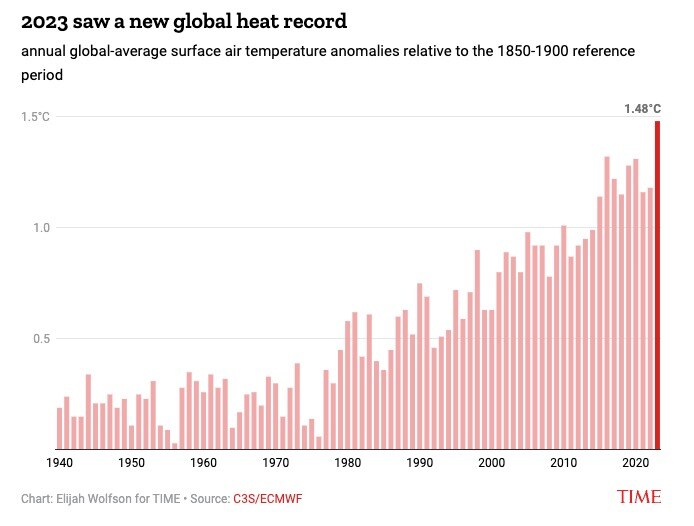
Our Task in 2024
Here’s the good news: You have a majorly important role to play in world-historic events. Here’s the bad news: Unprecedented catastrophes will befall humanity if we don’t do everything we can to change course.
I’ve been wishing people a happy 2024, and this time I mean it more than ever. We’re going to need all the wishes in the world, because this year looks like it’s going to be rough. As of right now, it appears that Donald Trump is likely to return to the presidency, where he has promised to wreak vengeance on those he thinks have wronged him over the years. (I am told that the Biden campaign is so far calm and unfazed—we might look back this time next year and wonder whether they should have been.) The far-right has a radical plan to purge the federal government of anyone who could check Trump’s ambitions, and he is talking openly about building huge new detention camps and rounding up immigrants (and of course, anyone who doesn’t have their papers strictly in order when his goons come knocking).
The threat to democracy is alarming. But the climate crisis is even worse. 2023 was the hottest year on record, and even scientists are astonished by the magnitude of the heat . 2024 may be even worse. And that’s just the beginning. Biden’s record on climate change has been horrible—amazingly, the administration actually boasts about increasing oil production to record levels. But Trump’s approach to climate is pure suicidal lunacy. Politico is predicting that “his return to the White House would bring an all-out war on climate science and policies—eclipsing even his first-term efforts that brought U.S. climate action to a virtual standstill. Those could include steps that aides shrank back from taking last time, such as meddling in the findings of federal climate reports.” (One former Trump advisor says he thinks Biden is waging a “climate jihad” and wants to reverse even the modest steps that have been taken to avert catastrophic harm.)

Then, of course, there is war. For the Palestinians of Gaza, of course, the past few months have been a true hell on Earth, with 1 percent of the population killed already, the rest of the residents on the brink of famine, and Israel promising to continue its attack through the rest of the year. As bad as it is already, things could get much worse. Currently the Biden administration, steadfastly committed to supporting Israel no matter what, appears to be getting involved in a region-wide war in the Middle East, which could draw in Iran, Lebanon, Yemen, Iraq, and Saudi Arabia. Israel’s ongoing killing of Palestinians is generating new waves of hate and resentment that are likely to result in new terror attacks, and U.S. support for Israel means that the U.S. itself now faces new threats of terrorism (a reminder that U.S. foreign policy rarely actually pursues or achieves “national security,” despite the constant use of that term).
The Middle East isn’t the only place where many innocent people are at risk of having their lives destroyed. The collapse of nuclear arms control agreements is sparking a new global arms race, and the war in Ukraine has led to the highest nuclear tensions between Russia and the U.S. since the Cold War. U.S. relations with China have been a disaster even as China builds up its own nuclear stockpile. A Third World War may not be in the cards for this year, but in ten years? Twenty? If present trends continue, it’s not at all inconceivable. The devastation inflicted by a nuclear conflict between superpowers would dwarf the hideous violence of the 1940s, but just because something would be a mutually-destructive catastrophe doesn’t mean it won’t happen.
If all that weren’t enough, some people think AI might kill us all. Even if you think that particular risk is overstated (as I do, since ChatGPT is still struggling to master basic arithmetic), there are very real problems that the new technology is likely to create—enabling scammers to supercharge their activities, destroying the reliability of information, etc. You can say one thing about being alive right now: there is no shortage of problems to tackle.
In fact, while it’s easy to look at the serious threats facing humankind and feel a sense of despair or doom, it’s important to respond not by lapsing into passivity (“everything is falling apart, I might as well watch Netflix and enjoy myself”) but by becoming energized and active. Given the cascade of horrible threats I’ve just outlined, I realize that might be difficult. The New York Times reported recently that voters are feeling fearful, doomed, and resigned. Biden and Trump are both incredibly unpopular, but it looks like we’re going to get stuck with one of them even if most of us would prefer someone else. That can make you feel powerless, like nothing you think really matters and what’s going to happen will happen regardless of what we say or do.
That trend toward resignation is palpable. I see it in my own domain, political media. People are reading the news less and less, and my theory for this is that they feel like there’s no point. Why think about, and argue about, the issues of the day if you don’t matter? Why expose yourself to endless depressing facts if we’re doomed? Why not use whatever time you have to learn to bake delicious pastries? A lot of people in my generation were burned by the failure of the Bernie Sanders campaign. They put their energy and hopes into a candidate who promised to actually tackle the most serious problems they faced, such as unaffordable healthcare and education and the climate disaster. He was crushed, and instead we got the guy who promised that “nothing would fundamentally change.” (A promise that, to be fair to Biden, he has more than delivered on.)

But it’s crucial not to succumb to this kind of pessimism. For one thing, it’s inaccurate. As alarming as the aforementioned threats are, they’re not actually beyond our ability to address. In fact, in many ways they’re quite straightforward. The climate crisis is solvable. It would be far worse if renewable energy technology didn’t exist. But it does. The transition away from fossil fuels is a major task, but all it requires is having a political leadership that isn’t suicidally insane. Likewise with global cooperation on eliminating nuclear weapons. If the U.S. had leaders who were committed to cooperating with China, for instance, rather than menacing it, we would face far less risk of a disastrous great power war in the 21st century. Honestly, the bar for what we need to achieve is quite low. Bernie Sanders, considered a radical in U.S. politics, was actually offering modest social democratic improvements that don’t depart substantially from the politics of Roosevelt. Universal healthcare is not an insane, pie-in-the-sky dream; it’s a reality in countries around the world. So many of us in the U.S. have just strangely given up on the idea that we can accomplish even modest improvements in government policy.

Will AI kill us all? I very much doubt it. It’s a problem, to be sure, but again, if we were committed to global cooperation on serious issues we could put international safety regulations in place that would make sure that the technology was a benefit and not a curse. The supposedly “intractable” Israel-Palestine conflict could also be solved, if the U.S. would stop giving Israel unconditional support and would actually pressure the Israeli government to agree to Palestinian statehood. The entire source of the present conflict is Israel’s continued refusal to grant Palestinians the same right of self-determination that Israel claims for itself, and Israel’s violence results in violent backlash from Palestinians, creating a never-ending cycle. If the U.S. stopped protecting Israel at the United Nations and joined with the rest of the international community to force Israel to accept a just settlement of the conflict, the core of the issue might actually be resolved. Instead, we have committed ourselves to fueling a never-ending cycle of violence.
All it would take to change this status quo is moderately sensible American political leadership. I realize that in our age of insanity and bullshit, this may seem like an impossible dream. But it really isn’t. We just need to get organized. I am sure you know plenty of people in your own life who are sensible, moral, and thoughtful, and you might have thought to yourself before “Man, they’d make such a better [school board official, state representative, president, etc.] than the people we have now.” But those good people don’t run, do they? And it’s in part because they feel like the system is rigged and there is nothing they can do about it.
But I genuinely think the biggest obstacle is the feeling of powerlessness itself, not the actual absence of power. I would say that pessimism, or “doomerism” as it’s come to be known online, poses a much greater threat to the world than any of the problems I listed earlier. Resignation virtually guarantees that nobody will try to do anything to stop the problem, and the worst will happen. I’m not a Steven Pinker type who thinks that people should stop complaining about the world, and points to charts showing that things are supposedly getting better. I don’t think they’re getting better, but I do think that we have within ourselves the capacity to act and radically change the world for the better. The problem is that people need to become convinced that this is true, and act as if they believe they’re going to win.
The great leftist revolutionary Victor Serge once wrote a passage that I think about often. He spent his life involved in often futile struggles, and saw his socialist dreams destroyed and many of his comrades killed. He could have ended his life as a pessimist. But he didn’t. Instead, in his memoir, he wrote that working to try to change the course of history is the most meaningful thing that one can do with one’s life:
“Early on, I learnt from the Russian intelligentsia that the only meaning of life lies in conscious participation in the making of history. The more I think of that, the more deeply true it seems to be. It follows that one must range oneself actively against everything that diminishes man, and involve oneself in all struggles which tend to liberate and enlarge him. This categorical imperative is by no way lessened by the fact that such an involvement is inevitably soiled by error: it is a worse error merely to live for oneself, caught within traditions which are soiled by inhumanity.”
Serge was able to look back on his life and be satisfied that he had tried to nudge history in the right direction, even though he had largely failed. I want to be able to have that same feeling at the end of my own life. We don’t know how long we’ll be around, and we have to use our time well. There’s no better use of that time than trying our damnedest to help humanity avoid the threats of climate change, war, and dictatorship. I do not want to look back, sixty years in the future, and think that I could have tried to help us avert the worst, but instead I looked at my phone a lot and resigned myself to feelings of despair.
The good news here is that we all matter. The tasks in front of us this year, and the next, could not be more urgent. There is no shortage of work to be done. But first we have to convince ourselves that a better world really is possible, and recommit ourselves to building it.


